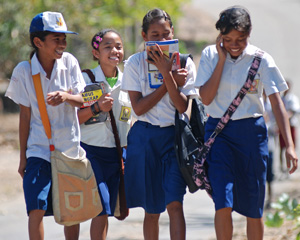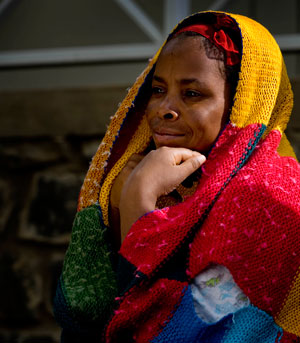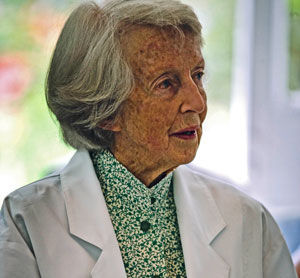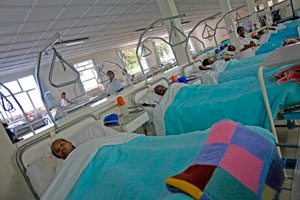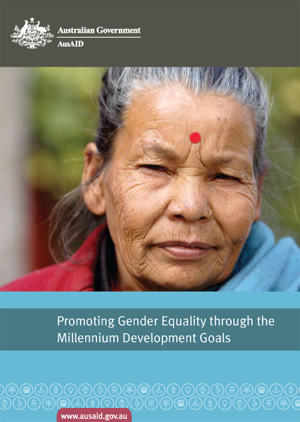International Women's Day: Supporting women in conflict situations
Indonesia: Workshop on gender equity in education
Ethiopian women get their lives back
Gender equality and the Millenium Develoment Goals
International Women's Day: Supporting women in conflict situations
Eliminating violence against women is a key factor in ensuring that women can exercise their full rights and achieve social and economic equality. The international community recognises that violence against women can escalate in conflict and post-conflict situations.
To mark International Women's Day, the Minister for Foreign Affairs and the Minister for the Status of Women announced that Australia will provide almost $4 million to support women's role in peacebuilding and to respond to violence against women in conflict situations.
The majority of this funding will assist the International Rescue Committee strengthen support services for more than 2,000 victims of gender-based violence in northern Iraq and improve the ability of the local government to respond to cases of violence against women.
The United Nations Inter-Agency Standing Committee Gender Capacity Stand-by-Project will also receive funding to train gender advisers to work in humanitarian emergencies
Funding will also be provided for programs to support women's involvement in peacebuilding in Asia and the Pacific.
The Australian Government is firmly committed to UN Security Council Resolution 1325 on women, peace and security and Resolution 1820 on ending sexual violence in conflict situations.
Australia recognises the important role that women in peacebuilding can play in preventing violence against women.
More information on women, peace and security
- Australia increases support for women in conflict situations (Media release)
- Statement by H.E. Gary Quinlan, Ambassador and Permanent Representative of Australia to the United Nations Security Council on Women, Peace and Security (external website)
- Final Report by Women's International League for Peace and Freedom (Australian Section) on Developing a National Action Plan on UN Security Council Resolution 1325 (external website)
Indonesia: Workshop on gender equity in education
In the lead up to International Women's Day, Australia supported the Government of Indonesia to run a workshop on gender equity in education. Held in Jakarta from 24-25 February, the event was part of a broader commitment to promote gender equity in Indonesia's schools and local government.
Indonesia's Minister for National Education, Prof. Dr. Ir Mohammed Nuh, opened the event and the State Minister for Women's Empowerment and Child Protection, H.E.Linda Gumelar, provided a keynote address that applauded the Government's effort in promoting gender equality in education.
The workshop focused on sharing achievements and lessons from pilot projects at school and local government level promoting gender equality in Indonesia's education sector. During the workshop participants explored ways to ensure girls, boys, men and women had equal access to and participation in all aspects of education. Participants also discussed how to enhance women's leadership in the sector.
Through the Australia Indonesia Basic Education Program, Australia has been supporting the government to develop innovative approaches to promote gender equity in schools. This support includes working with school communities on local strategies to ensure there is equal access to education for girls and boys. These strategies include:
- separate toilet facilities for boys and girls
- ensuring all students take part in school activities like sport and leadership groups, regardless of their gender
- designing and developing training on gender in education for teachers, principals and school committees
- working with school principals, teachers and parents and the local community to promote gender equity
- working with district education offices to improve the collection of education data related to gender, which is vital to local development planning.
The $387 million Australia Indonesia Basic Education Program aims to improve quality of and access to basic education for young Indonesians in poor and remote areas across the country. Over 48 per cent of students enrolled in schools under the program are from poor families. To date, more than 60,000 girls in Indonesia have been able to access education close to their homes through new schools built under this program.
Ethiopian women get their lives back
This is an extract of an article by Lucy Horodny originally published in Focus Magazine
As my taxi pulls up at the hospital gate, I see a driveway lined with women draped in colourful shawls, all waiting for the chance to get their lives back.
I am here to meet Australian gynaecologist, obstetrician and pioneer fistula surgeon, Dr Catherine Hamlin, co-founder with her late husband, Dr Reginald Hamlin, of the Hamlin Fistula Hospital in Addis Ababa, Ethiopia.
Armed with some gifts, I enter the ward where Dr Catherine Hamlin treats a patient, she is smiling and speaking quietly. As I walk towards her she greets me with, 'Have we met before?' An unusually tall woman now in her eighties, she looks just as I remember her in Canberra nearly ten years ago when I attended one of her many talks.
We sit in the nurses' quarter where Catherine tells me about the sixth fistula hospital in Metu, southern Ethiopia, and the College of Midwives, just outside Addis Ababa. We discover that we share a passion for Ethiopia's rugged and sometimes inhospitable landscape–a stunning ancient land where 85 per cent of the population live in rural villages that are two or three days walk to the nearest road and even further to medical care.
"In the West, fistulas became a thing of the past by the early 20th century as medical intervention, including caesarean sections, were increasingly used to save mothers and babies," Catherine explains.
She tells me that in developing countries, pregnancy and childbirth are still highly risky. With no medical assistance to help deliver her baby, a mother with a small or malformed pelvis or badly positioned child may be in labour for five or more days without help. As a result, the woman's bladder or intestines can be damaged and a hole or fistula may develop. The result can be non-stop bladder leakage or even worse, faecal leakage.
This condition makes her an outcast from society, rejected by her husband and family because of her smell and often relegated to a shed well away from everyone. She may suffer quietly for months, years or even decades before she receives treatment.
The Hamlin Hospital's fistula surgery achieves a success rate of more than 93 per cent. However, a small percentage of patients cannot be completely cured and require catheters and ongoing medical monitoring. They receive this at the "Village of Joy" or Desta Mender, a self-help village near Addis Ababa, where the women learn to grow food and maintain an independent life.
I ask Catherine what her wish for the future might be. "Oh that's easy," she says, smiling, "To close the fistula clinics and turn them into ordinary hospitals because we don't need to treat these fistulas any more."
Australia has supported the Hamlin Fistula Hospital in Addis Ababa since 1984 and helped to extend its services to rural locations. In January 2009, Australian Minister for Foreign Affairs Stephen Smith announced additional funding of $2.3 million to expand the Hamlin College of Midwives and support 25 rural maternal health clinics in Ethiopia. By 2010, the college expects to train and deploy about 20 midwives per year with a total student body of 60 midwives at any one time.
More about what AusAID is doing in Africa.
More about the Hamlin Fistula Hospital.
Gender equality and the Millenium Development Goals
International Women's Day, held on 8 March each year, provides an opportunity to celebrate the achievements of women around the world.
It is also an opportunity to reflect on the significant challenges that remain in realising equality between men and women across the world.
Almost 100 countries remain off-track to achieve the Millennium Development Goal (MDG) of eliminating gender disparity in all levels of education by 2015.
More than 500,000 women in developing countries die annually in childbirth or from maternity related complications.
Globally, one in three women experience violence.
Women are under-represented in decision-making, holding less than 1 in 5 parliamentary seats across the world.
Australia is taking active measures to advance gender equality through its international development assistance program. For further information on how AusAID is promoting gender equality through the MDGs see Promoting Gender Equality through the Millennium Development Goals.
To help mark International Women's Day in Australia, AusAID has partnered with UNIFEM Australia to host a series of events across Australia featuring high profile international and Australian speakers.
This year also marks the 15th anniversary of the Beijing World Conference for Women, and the commitment made by world leaders to women's rights through the Beijing Platform for Action. Australia has produced a report on our progress in implementing the Beijing Platform for Action.
Countries from around the world are meeting at the United Nations' Commission on the Status of Women on 1-12 March 2010 to review progress in implementing these commitments.

